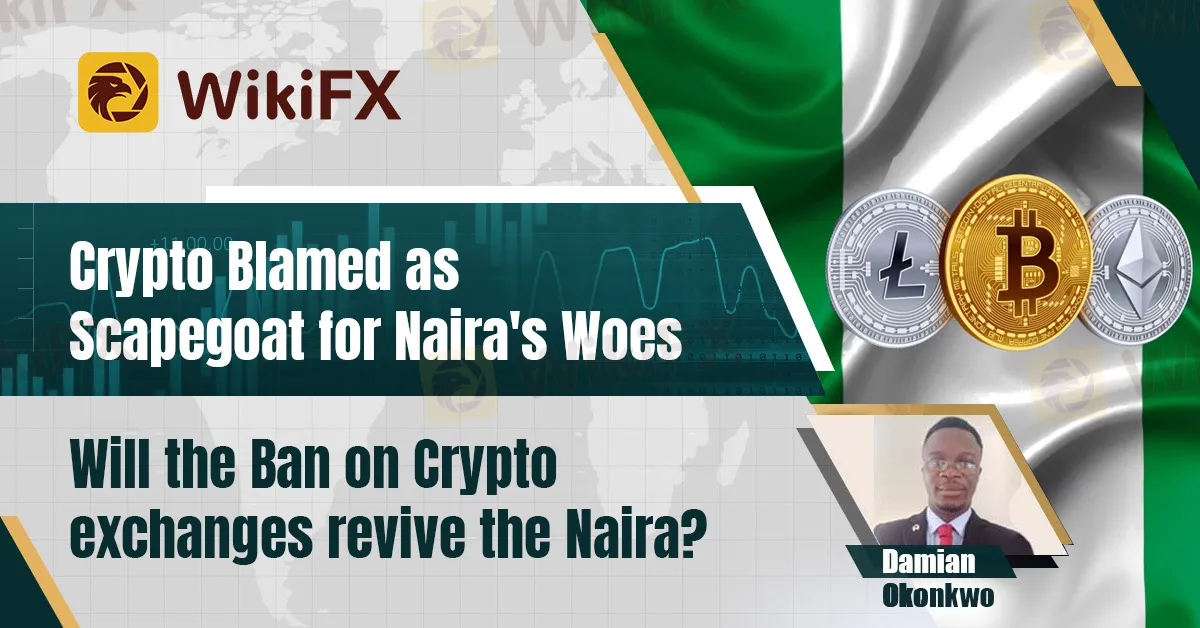简体中文
繁體中文
English
Pусский
日本語
ภาษาไทย
Tiếng Việt
Bahasa Indonesia
Español
हिन्दी
Filippiiniläinen
Français
Deutsch
Português
Türkçe
한국어
العربية
Crypto Blamed as Scapegoat for Naira's Woes, Will the Ban on Crypto exchanges revive the Naira?
Abstract:Nigeria's crypto landscape remains in flux. While the ban may not be the main culprit behind the Naira's struggles, a more nuanced approach is needed.

By: Damian Okonkwo

Introduction
The Nigerian Naira has been on a protracted downward spiral in 2024, leading to finger-pointing and a search for possible causes. Recently, the Nigerian government has pushed the blame to the activities of P2P crypto traders creating high demand for dollars across the trading platforms. Will the ban on Crypto exchanges solve the Naira's woes?
Naira's Woes: A Multitude of Factors
The Naira's struggles stem from a confluence of factors outside crypto. These includes:
1. Global Oil Price Fall: Nigeria is heavily reliant on oil exports. The recent decline in global oil prices has significantly reduced government revenue, weakening the Naira's value.
2. Dollar Scarcity: Lower oil revenue has limited Nigeria's access to foreign exchange, making it harder for businesses and individuals to obtain dollars, further pressuring the Naira
3. High Inflation: Rising inflation erodes the purchasing power of the Naira, discouraging investment and economic activity.
Crypto: Not the Main Culprit
While cryptocurrency use has grown in Nigeria, it's unlikely to be a significant contributor to the Naira's woes. The total volume of crypto transactions in Nigeria is dwarfed by the official foreign exchange market. Additionally, the CBN ban primarily targeted centralized exchanges, not peer-to-peer transactions, which are harder to regulate.
The Ban's Impact: Double-Edged Sword
The CBN's ban on crypto exchanges aimed to curb capital flight and protect Nigerians from potential scams. However, it also:
Pushed Nigerians to Foreign Exchanges: The ban drove some Nigerians to use foreign crypto exchanges, making it harder for the CBN to track financial flows.
Stifled Innovation: Nigeria has a vibrant tech scene, and the ban hinders the development of a local crypto industry that could contribute to economic growth.
Reviving the Naira: A Holistic Approach
The path to a stronger Naira requires a multi-pronged approach:
● Diversifying the Economy: Reducing reliance on oil by promoting other sectors like agriculture and manufacturing can provide a buffer against oil price fluctuations.
● Increasing Foreign Investment: Creating a more attractive investment climate can entice foreign investors to bring in much-needed dollars.
● Taming Inflation: Implementing sound fiscal and monetary policies to curb inflation is crucial for stabilizing the Naira.
The Future of Crypto in Nigeria
Nigeria's crypto landscape remains in flux. While the ban may not be the main culprit behind the Naira's struggles, a more nuanced approach is needed. Fostering innovation and creating a regulatory framework for crypto could be more beneficial than an outright ban. Reviving the Naira requires addressing the underlying economic issues and exploring new opportunities, not scapegoating new technologies.

Disclaimer:
The views in this article only represent the author's personal views, and do not constitute investment advice on this platform. This platform does not guarantee the accuracy, completeness and timeliness of the information in the article, and will not be liable for any loss caused by the use of or reliance on the information in the article.
Read more

Italian Regulator Warns Against 5 Websites
The Italian regulator, CONSOB has issued a warning against five websites offering unauthorized financial services. This regulatory action aims to protect the public from fraudulent activities.

Trader Exposes Unethical Practices by STP Trading
A recent allegation against STP Trading has cast doubt on the firm's business practices, highlighting the potential risks faced by retail traders in an increasingly crowded and competitive market.

What Makes Cross-Border Payments Easier Than Ever?
Cross-border payments are now faster, cheaper, and simpler! Explore fintech, blockchain, and smart solutions to overcome costs, delays, and global payment hurdles.

Coinbase Under Scrutiny Amid Wrapped Bitcoin Delisting Controversy
Coinbase has come under fire after announcing its decision to delist Wrapped Bitcoin (wBTC), a move critics claim could be driven by competitive interests. The delisting, set to take effect on 19 December, has sparked allegations of market manipulation and concerns about fairness in the cryptocurrency ecosystem.
WikiFX Broker
Latest News
Hackers Charged for $11M Crypto Theft Using SIM-Swaps
Role of Central Banks in the FX Market
FCA Alerts Against Sydney FX
What Makes Cross-Border Payments Easier Than Ever?
Trader Exposes Unethical Practices by STP Trading
Malaysian Man Loses RM113,000 in Foreign Currency Investment Scam
Bitcoin Nears $100,000: A Triumph of Optimism or a Warning Sign?
Mastercard Partners with JPMorgan for B2B Cross-Border Payments
FCA Identifies Clone Firm Exploiting Admiral Markets' Credibility
Coinbase Under Scrutiny Amid Wrapped Bitcoin Delisting Controversy
Currency Calculator


